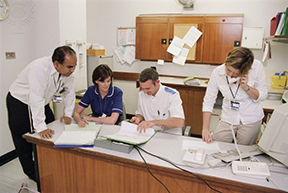Professionalism in Nursing

By Tresa Kaur Dusaj, PhD, RN-BC, CNE, CHSE, CTN-A
Faculty Program Director
 I recently attended a conference where professional was discussed and defined. It became apparent that professionalism is defined uniquely through one’s own interpretation. I define professionalism as representing nursing in all aspects of my life through my actions, values, practices. Many students encounter this term in their coursework and are encourage to promote nursing. This is easier said than done. Professionalism goes beyond being a “cheerleader” for nursing. It encompasses representation, advocacy, service, learning, and discipline.
I recently attended a conference where professional was discussed and defined. It became apparent that professionalism is defined uniquely through one’s own interpretation. I define professionalism as representing nursing in all aspects of my life through my actions, values, practices. Many students encounter this term in their coursework and are encourage to promote nursing. This is easier said than done. Professionalism goes beyond being a “cheerleader” for nursing. It encompasses representation, advocacy, service, learning, and discipline.
Here are five ways you can promote professionalism in your career as a nurse:
- Join a professional organization. As a student, you are eligible for a reduced rate to many professional organizations. I joined the National League for Nursing as I knew Nursing Education was my career path in nursing. I enjoyed the many benefits as a student which included webinars, simulation resources, networking, reduced conference fees, and more. It was also a membership that I could then list on my resume.
- Advocate for your profession. I have been asked to represent nursing to public and state officials. Your license and degrees bring a wealth of credibility to your name. I advocated for nursing education by asking State Senators for greater funds for nursing scholarships. Then as a student, and now as a faculty member, I see the need for funds to address the global nursing shortage.
- Volunteer your time. Service to your community extends your role as a nurse. Community service offers the compassion of our profession while giving to those in need. As a nurse representative, you may be impacting young children who have never interacted with a nurse, lending a hand to a person who needs your assistance, or offering a listening ear to learn how others view the world. I volunteered to teach an exercise class in a senior high rise in Baltimore, MD. I quickly learned that there were other things the seniors needed like computer training and medication reconciliation. One program flourished so many more to impact the small community.
- Teach and be taught. Learning never ends for a nurse. You are always adapting to new research, insights, and technology. Some states require mandatory education credits while other do not. I encourage all nurses to stay current by reading journal articles, attending conferences, and sharing their own expertise with their colleagues and through professional conferences. Also, interdisciplinary education is a great way to learn the roles of members of the health care team.
- Read the ANA Social Policy Statement (ANA, 2010). The American Nurse’s Association has written a document on professionalism. I encourage you to read through this document which highlights the role of the nurse in the profession and in everyday life. For example, I am careful as to what I post on social media especially when I know the world many read it one day. I promote nursing by celebrating my role as an educator and share my passion for nursing.
As nurses’ week approaches us, I challenge you to take on one or two items from the list above. You might inspire others to join the profession. You will shine light on the role and responsibilities of the profession. You will share your passion and love for nursing with others. You are a part of a unique, trusted, and rewarding professional and be proud, be professional!
Reference
American Nurses Association. (2010). Nursing’s social policy statement: The essence of the profession (3rd ed.). Silver Spring, Md.: American Nurses Association.
Photo Credit: John Birdsall MR / John Birdsall Social Issues Photo Library / Press Association Images / Universal Images Group


